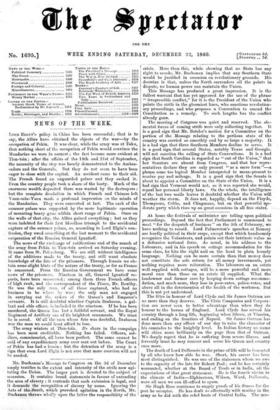Mr. Buchanan's Message to Congress on the 3d of December
amply testifies to the extent and intensity of the strife now agi- tating the Union. The larger part is devoted to the subject of secession. It contains broad statements in favour of extending the area of slavery ; it contends that such extension is legal, and it demands the recognition of slavery by name. Ignoring the Acts of the South, which provoked agitation in the North, Mr. Buchanan throws wholly upon the latter the responsibility of the
crisis. More than this, while showing that no State has any right to secede, Mr. Buchanan implies that any Southern State would be justified in secession on revolutionary grounds. His doctrine is that, unless the North surrenders all the points in dispute, no human power can maintain the Union.
This Message has produced a great impression. It is the fullest warrant that has yet appeared for the use of the phrase " irrepressible conflict," for it is the President of the Union who paints the strife in the gloomiest hues, who sanctions revolution- ary proceedings, and who proposes a Convention to amend the Constitution as a remedy. To such lengths has the conflict already gone.
The meeting of Congress was quiet and reserved. The ele- mental forces of coming strife were only collecting together. It is a good sign that Mr.eBoteler's motion for a Committee on the portion of the Message relating to the perilous state of the country was carried so smoothly and by so large a majority. It is a bad sign that three Southern Members decline to serve. It is a good sign that several States, notably Texas and Georgia, will not sanction the calling of State Conventions. It is a bad sign that South Carolina is regarded as " out of the Union," that her Senators are absent from Congress, and that her repre- sentatives declare they are only present " as a mere form "—a phrase some too logical Member interpreted to mean-present to . receive pay and mileage. It is a good sign that the Senate is about to appoint a Committee on the State of the Union. It is a bad sign that Vermont would not, as it was reported she would, repeal her personal liberty laws. On the whole, the intelligence of the last two mails leaves it doubtful whether the Union will weather the storm. It does not, happily, depend on the Floyds, Thompsons, Cobbs, and Clingmans, but on that powerful nio- derate party which rises up on great occasions in all free states. ti


























